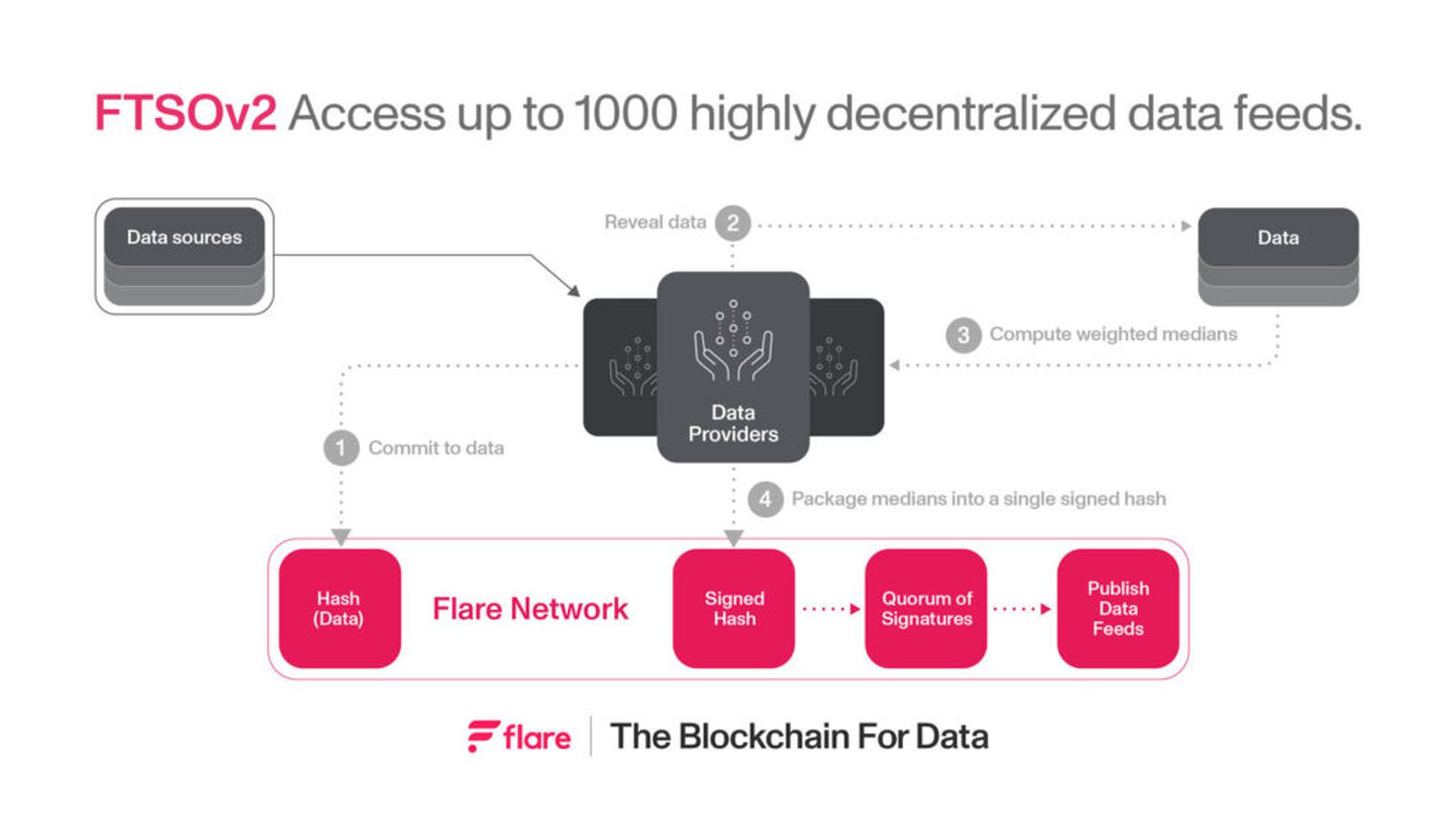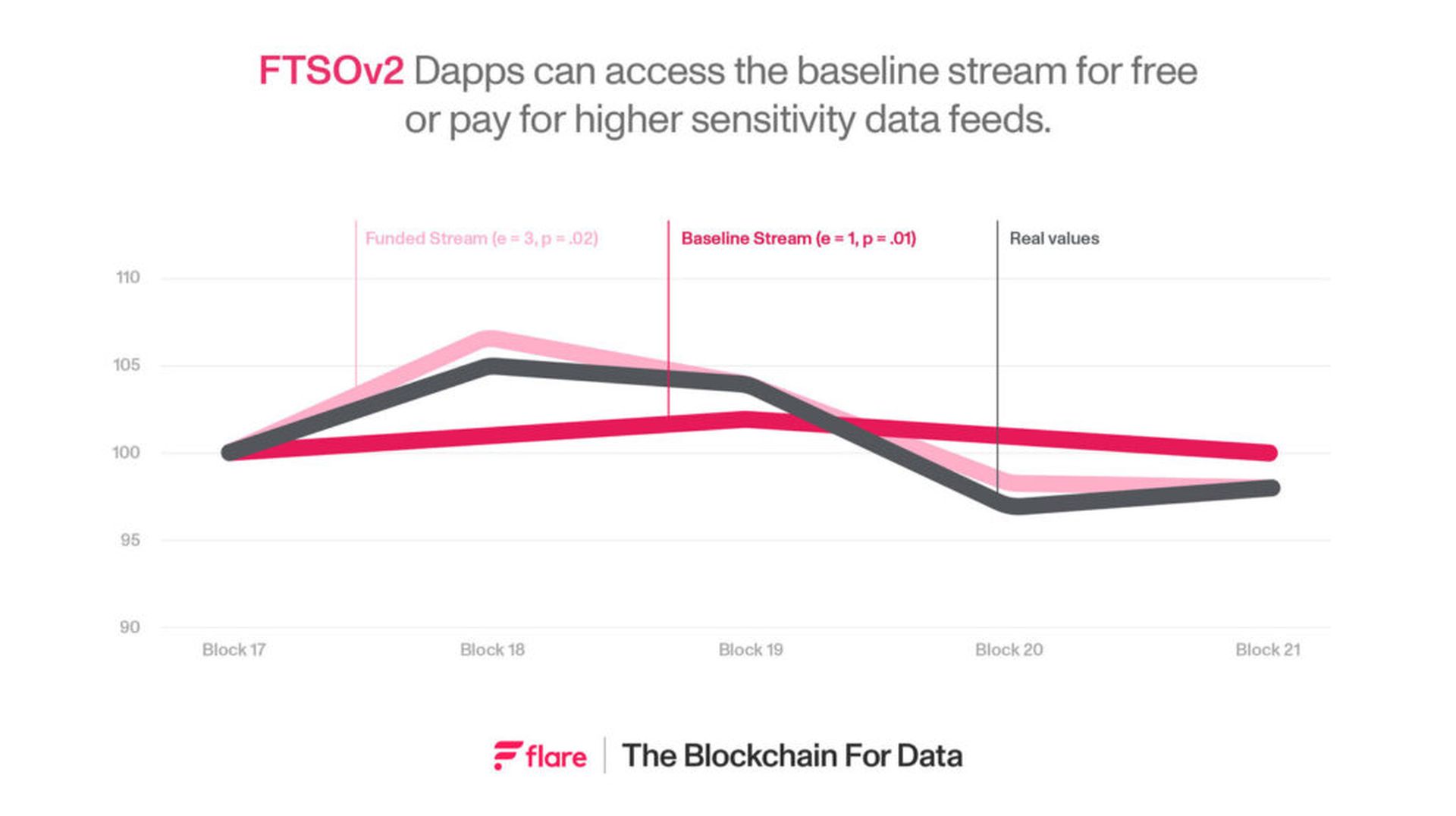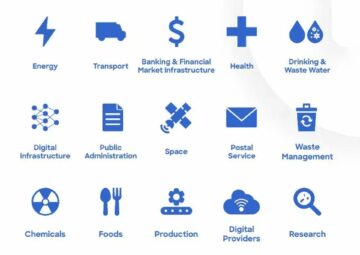Everything from lending platforms to prediction markets relies on reliable and timely information from oracles, which link the blockchain with real-world data.
However, several obstacles have been to a completely decentralized, safe, and effective oracle service. To tackle these problems directly, Flare introduced FTSOv2, a groundbreaking improvement to the oracle landscape.
Enhancing the speed of DeFi apps and setting a new benchmark for what we should expect from oracle services, FTSOv2 offers more frequent and accurate data updates over a completely decentralized network.
Why Oracles are important?
Oracles are important in the blockchain space because they integrate third-party data with blockchains. This allows smart contracts to respond to actual market or weather conditions. This is critical since DeFi operations depend on external data for fairness and accuracy, but blockchains don’t have this capability natively. For example, DeFi systems need real-time price feeds to change collateral.
The integrity of DeFi is jeopardized by the difficulties that conventional Oracles encounter. A lack of genuine decentralization is at the heart of the problem, as it leaves data susceptible to manipulation and inaccurate results when relied upon by only a few sources. This puts security at risk since data streams must be impenetrable to avoid abuse, which may impact data quality and timeliness.
In light of these difficulties, new Oracle solutions that strike a good balance between decentralization, security, and dependability are required to support the expansion of DeFi.
The FTSOv2 upgrade
Flare’s development of FTSOv2 marks a big step forward in decentralized Oracle services for the DeFi industry, improving scalability, accuracy, and reactivity. This update solves critical concerns such as centralization, security vulnerabilities, and data timeliness that have plagued previous Oracles.
The revised design of FTSOv2 increases update frequency, guaranteeing that DeFi platforms have access to the most up-to-date information for reliable transactions. It also improves performance to handle more queries effectively and broadens data sources to encompass a variety of asset types, such as stocks and commodities.
An important aspect is high-frequency updates, possibly with each new block, allowing for near-real-time data access. This is critical for instant data applications, such as high-frequency trading. These enhancements establish FTSOv2 as a premier solution in Oracle technology, providing a more decentralized, secure, and efficient DeFi service.
How does the FTSOv2 update work?
FTSOv2 includes anchor and stream upgrades that enhance Oracle services in DeFi. Anchor updates improve data accuracy by integrating many sources’ estimates at shorter intervals and reflecting market developments more quickly.

The new FTSO update reduces gas consumption by offloading the most costly computations to providers and minimizing storage costs through compressed hashed form uploads. This allows for faster speeds and wider coverage without high gas costs for users.
Stream updates deliver real-time, incremental data with each new blockchain block, using rotating suppliers. This dual method offers trustworthy data for DeFi applications by combining solid, precise feeds with the flexibility of quick updates. FTSOv2 improves the Oracles’s flexibility, security, and resilience, reducing data manipulation risks and enabling a wide range of DeFi applications.
Enhancing security and reliability data in DeFi
By incorporating decentralization into its core, FTSOv2 seeks to improve the security and dependability of DeFi, hence resolving weaknesses in Oracle services. Minimizing the possibility of manipulation or failure at a single point ensures security via the collective data validation by a wide network of nodes.
The system’s permissionless participation paradigm promotes varied contributions, further decentralizing data supply and improving fault tolerance. These methods establish a new benchmark for safe, decentralized financial transactions by guaranteeing solid Oracle services.
The FTSOv2 update also expands DeFi’s data horizon, including stocks and commodities beyond traditional cryptocurrency price feeds, enabling more complex financial products like traditional markets. This broadening allows DeFi to tap into global market dynamics, enhancing investment and hedging opportunities.
Additionally, FTSOv2 reduces data delivery latency, ensuring DeFi platforms access timely information for quick decision-making, which is crucial for trading strategies, risk management, and adjusting collateral requirements. This dual enhancement of data scope and immediacy improves DeFi’s operational efficiency, competitiveness, and innovation potential, aligning it closer with the dynamics of global financial markets.
The advantages of stream updates and incentives
FTSOv2’s stream updates functionality provides real-time data into the DeFi ecosystem, refreshing data streams with each new block. This guarantees that DeFi apps have the most up-to-date information possible by choosing a rotating set of data providers to send incremental updates, reducing information latency. This technological improvement provides a more dynamic, responsive Oracles system better suited to financial markets’ fast-paced nature.

The advantages of DeFi applications include better trading choices and execution on platforms, less slippage, and increased market efficiency. For lending platforms, real-time data enables faster modifications to collateral requirements in reaction to market movements, increasing security.
Furthermore, stream updates allow more dynamic risk management tactics that adapt to real-time market situations, decreasing systemic risk and improving DeFi ecosystem stability. This feature represents a substantial improvement in data usefulness, operational capabilities, and user experiences in DeFi, in line with worldwide financial industry trends.
FTSOv2’s subtle incentive system pays data providers depending on the correctness and dependability of their inputs, matching provider incentives to provide a dependable, secure, and efficient Oracle service. This approach fosters accuracy by paying providers for data that closely matches the network’s consensus values and active involvement, which improves network decentralization and robustness.
The incentives system helps the Flare Network by promoting correct and timely data inputs, creating a competitive but cooperative atmosphere that enhances data quality. This technique guarantees that users have access to high-quality data feeds (up to 1000 data feeds every 90 seconds), which are critical for DeFi applications, while also providing a safe, stable environment and fostering interaction throughout the Flare Network.
By motivating high-quality data submissions and wide participation, FTSOv2 improves the performance and reliability of its Oracle service, supporting a more decentralized financial environment.
FTSOv2’s potential impact on decentralized finance
The debut of FTSOv2 is expected to substantially influence the DeFi ecosystem by improving data integrity, timeliness, and security, as well as creating new standards for Oracle services required for DeFi operations. This update enhances DeFi apps’ infrastructure, allowing for more complex, dependable, and user-friendly services.
It plans to drive DeFi innovation by attracting new applications that use FTSOv2’s capabilities to enable previously unfeasible financial products and services. This might entice institutional investors and conventional financial institutions to use DeFi for safe, efficient blockchain solutions.
FTSOv2’s focus on decentralization, security, and real-time data, along with a strong incentive system, might serve as a model for future Oracle services, driving further blockchain integration and efficiencies. Its design may inspire similar ideas in other blockchain initiatives, strengthening the ecosystem.
Furthermore, FTSOv2 has the potential to bridge the gap between blockchain and conventional finance by providing data on larger asset classes, such as equities and commodities, while maintaining high security and low latency.
This integration may accelerate blockchain adoption in traditional markets, resulting in efficient, transparent, and accessible financial solutions that combine decentralized and traditional finance, creating a more equitable global economy. FTSOv2 is a watershed moment in DeFi, pointing to a future in which blockchain improves financial services across industries.
Featured image credit: WangXiNa/Freepik
- SEO Powered Content & PR Distribution. Get Amplified Today.
- PlatoData.Network Vertical Generative Ai. Empower Yourself. Access Here.
- PlatoAiStream. Web3 Intelligence. Knowledge Amplified. Access Here.
- PlatoESG. Carbon, CleanTech, Energy, Environment, Solar, Waste Management. Access Here.
- PlatoHealth. Biotech and Clinical Trials Intelligence. Access Here.
- Source: https://dataconomy.com/2024/04/17/decentralizing-data-how-ftsov2-is-revolutionizing-oracle-services-in-defi/
- :has
- :is
- $UP
- 1
- 2%
- 90
- a
- abuse
- accelerate
- access
- accessible
- accuracy
- accurate
- across
- active
- actual
- adapt
- adjusting
- Adoption
- advantages
- aligning
- allow
- Allowing
- allows
- along
- also
- Anchor
- and
- applications
- approach
- apps
- ARE
- AS
- aspect
- asset
- At
- Atmosphere
- attracting
- avoid
- Balance
- BE
- because
- been
- Benchmark
- Better
- between
- Beyond
- Big
- Block
- blockchain
- blockchain adoption
- blockchain integration
- blockchain solutions
- Blockchain space
- blockchains
- BRIDGE
- but
- by
- capabilities
- capability
- Centralization
- change
- choices
- choosing
- classes
- closely
- closer
- Collateral
- Collective
- combine
- combining
- Commodities
- competitive
- competitiveness
- completely
- complex
- computations
- Concerns
- conditions
- Consensus
- consumption
- contracts
- contributions
- conventional
- cooperative
- Core
- correct
- correctness
- costly
- Costs
- coverage
- Creating
- critical
- crucial
- cryptocurrency
- Cryptocurrency Price
- data
- data access
- data quality
- debut
- Decentralization
- decentralized
- decentralized network
- decentralizing
- Decision Making
- decreasing
- DeFi
- Defi Apps
- DeFi ecosystem
- defi platforms
- deliver
- delivery
- depend
- dependable
- Depending
- Design
- Development
- developments
- difficulties
- directly
- does
- Dont
- drive
- driving
- dual
- dynamic
- dynamics
- each
- economy
- ecosystem
- Effective
- effectively
- efficiencies
- efficiency
- efficient
- enable
- enables
- enabling
- encompass
- encounter
- enhance
- enhancement
- enhancements
- Enhances
- enhancing
- ensures
- ensuring
- Environment
- equitable
- Equities
- establish
- estimates
- Every
- example
- execution
- expands
- expansion
- expect
- expected
- Experiences
- external
- Failure
- fairness
- fast-paced
- faster
- fault
- Feature
- few
- finance
- financial
- Financial institutions
- financial products
- financial services
- flare
- Flare Network
- Flexibility
- Focus
- For
- form
- Forward
- fostering
- fosters
- Frequency
- frequent
- from
- functionality
- further
- future
- gap
- GAS
- genuine
- Global
- Global economy
- global financial
- global market
- good
- groundbreaking
- guarantees
- handle
- hashed
- Have
- Heart
- hedging
- helps
- hence
- High
- High-Frequency
- high-frequency trading
- high-quality
- horizon
- How
- HTTPS
- ideas
- image
- Impact
- important
- important aspect
- improve
- improvement
- improves
- improving
- in
- In other
- inaccurate
- Incentive
- Incentives
- include
- includes
- Including
- incorporating
- increased
- Increases
- increasing
- incremental
- industries
- industry
- influence
- information
- Infrastructure
- initiatives
- Innovation
- inputs
- inspire
- instant
- Institutional
- institutional investors
- institutions
- integrate
- Integrating
- integration
- integrity
- interaction
- into
- introduced
- investment
- Investors
- involvement
- IT
- ITS
- jpg
- Lack
- landscape
- larger
- Latency
- leaves
- lending
- less
- light
- like
- Line
- LINK
- Low
- maintaining
- management
- Manipulation
- many
- Market
- Markets
- matches
- matching
- max-width
- May..
- method
- methods
- might
- minimizing
- model
- Modifications
- moment
- more
- most
- motivating
- movements
- must
- natively
- Nature
- Need
- network
- New
- nodes
- obstacles
- of
- Offers
- on
- only
- operational
- Operations
- opportunities
- or
- oracle
- Oracles
- Other
- over
- paradigm
- participation
- paying
- pays
- performance
- permissionless
- plagued
- plans
- Platforms
- plato
- Plato Data Intelligence
- PlatoData
- Point
- possibility
- possible
- possibly
- potential
- precise
- prediction
- prediction markets
- premier
- previous
- previously
- price
- Problem
- problems
- Products
- Products and Services
- promotes
- promoting
- provide
- provider
- providers
- provides
- providing
- Puts
- quality
- queries
- Quick
- quickly
- range
- reaction
- real world
- real-time
- real-time data
- reduces
- reducing
- reflecting
- reliability
- reliable
- relies
- represents
- required
- Requirements
- resilience
- resolving
- Respond
- responsive
- resulting
- Results
- Revolutionizing
- Risk
- risk management
- risks
- robustness
- safe
- Scalability
- scope
- seconds
- secure
- security
- Seeks
- send
- serve
- service
- Services
- set
- setting
- several
- shorter
- should
- similar
- since
- single
- situations
- slippage
- smart
- Smart Contracts
- solid
- solution
- Solutions
- Solves
- Sources
- Space
- speed
- speeds
- Stability
- stable
- standards
- Step
- Stocks
- storage
- strategies
- stream
- streams
- strengthening
- strike
- strong
- Submissions
- substantial
- substantially
- subtle
- such
- suited
- suppliers
- supply
- support
- Supporting
- susceptible
- system
- systemic
- systemic risk
- Systems
- tackle
- tactics
- Tap
- technique
- technological
- Technology
- that
- The
- the security
- their
- These
- they
- third-party
- third-party data
- this
- Through
- throughout
- timely
- to
- tolerance
- Trading
- Trading Strategies
- traditional
- traditional finance
- traditional markets
- Transactions
- transparent
- Trends
- trustworthy
- types
- up-to-date
- Update
- Updates
- upgrades
- upon
- use
- User
- user-friendly
- users
- using
- validation
- Values
- varied
- variety
- via
- Vulnerabilities
- we
- weaknesses
- Weather
- WELL
- What
- when
- which
- while
- wide
- Wide range
- wider
- with
- without
- Work
- worldwide
- zephyrnet











